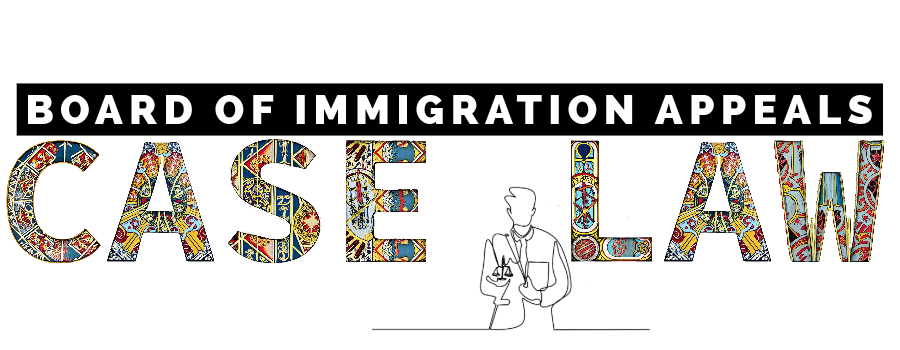When Is A Government “Unable or Unwilling” To Protect Someone
When is a Government “unable or unwilling” to protect? The Board of Immigration Appeals (BIA), issued a precedential decision on asylum law, providing more guidance on how asylum applicants can meet the requirements of showing that a government is “unable or unwilling” to protect them from harm by private actors. Matter of C-G-T-, 28 I&N Dec. 740 (BIA 2023). When An Asylum Applicant Doesn’t Report Their Harm/Mistreatment The Board starts by addressing the common situation where that an Applicant argues that the the government in their native country is unable or unwilling to protect them but they never reported the harm or mistreatment that they suffered because the government would not have been able or willing to do anything. The Board cites to two First Circuit cases and states that an Applicant who didn’t report the mistreatment because the government is corrupt has to provide something more than their own subjective belief that the police are corrupt to establish unable or unwilling. “[A] failure to report mistreatment—even if based on the [respondent’s] subjective belief that authorities are corrupt—is not, without more, sufficient to show that” the government is unable or unwilling to protect the respondent. Morales-Morales v. Sessions, 857 F.3d 130, 135 (1st Cir. 2017) (collecting cases, and affirming the determination that the respondent failed to demonstrate government authorities were unable or unwilling to protect him); accord Vila-Castro v. Garland, 77 F.4th 10, 13–14 (1st Cir. 2023). Matter of C-G-T-, 28 I&N Dec. 740 (BIA 2023). The Board is clear however, that an Applicant is not required to have reported the harm. “Failure to report harm is ‘not necessarily fatal’ to a claim of persecution if the applicant ‘can demonstrate that reporting private abuse to government authorities would have been futile’ or dangerous. Matter of C-G-T-, (quoting Rosales Justo v. Sessions, 895 F.3d 154, 165 (1st Cir. 2018) (quoting Morales-Morales, 857 F.3d at 135)). As an example the Board looks to an earlier decision where they found that it may be futile or dangerous for an abused child to seek protection from the authorities because of the fact that they may not be able to properly articulate their fears due to their age, or, in cases where the abuser is a family member, they may prevent the child from reporting the abuse. How to Determine Whether The Applicant’s Failure to Report Their Harm Is Reasonable The Board’s decision is that the determination is ultimately a fact-specific inquiry. There will be substantial difference in the ability of applicants to report their based on factors such as their age. The Board remanded the case back to the Immigration Judge with instructions that on remand, “the Immigration Judge should consider the reasonableness of the respondent’s failure to seek assistance from the authorities in his country as part of considering all evidence regarding whether the government was unable or unwilling to protect the respondent.“ When considering the reasonableness of the respondent/applicant’s failure to seek assistance from the authorities the Immigration Judge should considering “the respondent’s testimony, available corroborating evidence, and country conditions reports.” In other words, the Court should consider not only the Applicant’s stated reason for not reporting the harm but also all the other evidence in the record which may make their failure to report the harm reasonable. Sexual Orientation IS A Particular Social Group In this decision the Board again expressly acknowledges sexual orientation as being an immutable characteristic that is beyond the power of an individual to change or is so fundamental to individual identity that they ought not be required to change it. The Board explicitly states, I believe for the first time in a published decision since 1994, that sexual orientation is a particular social group for purposes of asylum. The Board actually compares being forced to hide one’s sexual orientation to being forced to hide one’s religion, citing Shan Zhu Qiu v. Holder, 611 F.3d 403, 409 (7th Cir. 2010), a case where the Seventh Circuit concluded that requiring a respondent to stop practicing his religion or simply hope he can evade discovery runs contrary to the asylum laws. They apply the same rationale to sexual orientation in this decision. As a general matter, we do not base consideration of an applicant’s fearof future harm on the ability or requirement to hide his or her sexualorientation. Protection under asylum and withholding of removal is availableto applicants who fear persecution on account of their membership in aparticular social group based on sexual orientation. Kadri v. Mukasey, 543F.3d 16, 21 (1st Cir. 2008); Matter of Toboso-Alfonso, 20 I&N Dec. at822–23. Sexual orientation, like other protected grounds, is “a characteristicthat either is beyond the power of an individual to change or is sofundamental to individual identity or conscience that it ought not be requiredto be changed.” Matter of Acosta, 19 I&N Dec. 211, 233 (BIA 1985),modified on other grounds by Matter of Mogharrabi, 19 I&N Dec. 439 (BIA1987). Matter of C-G-T-, 28 I&N Dec. 740 (BIA 2023). Full Decision here. The Three Takeaways From Matter of C-G-T- (1) Determining whether the government is or was unable or unwilling to protect therespondent from harm is a fact-specific inquiry based on consideration of all evidence. (2) A respondent’s failure to report harm is not necessarily fatal to a claim of persecutionif the respondent can demonstrate that reporting private abuse to government authoritieswould have been futile or dangerous. (3) When considering future harm, adjudicators should not expect a respondent to hide hisor her sexual orientation if removed to his or her native country. Full text of the decision https://www.justice.gov/eoir/page/file/1594626/download

